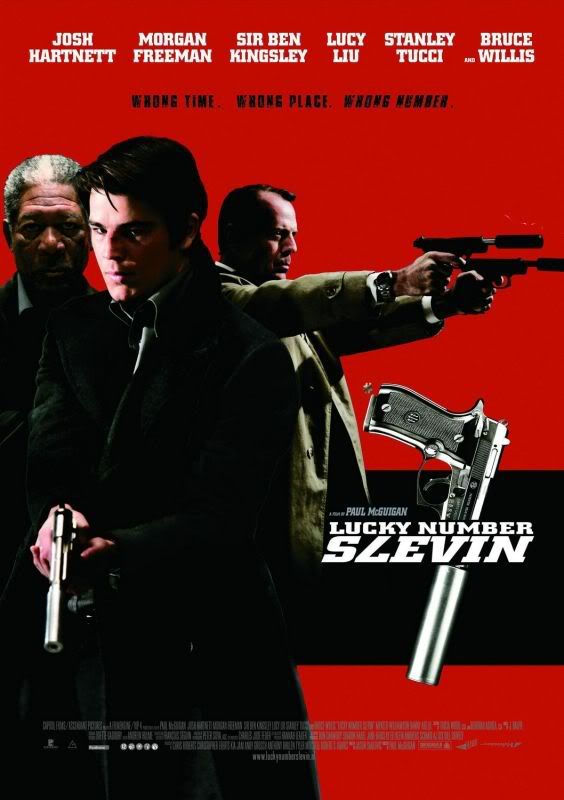
[audio:http://www.blueinkalchemy.com/uploads/slevin.mp3]
The law of averages isn’t something you can avoid as you produce or study a given set of data. This applies just as much to entertainment as it does to less interesting data. Be it a fiction franchise, the songs in a band’s repertoire or a series of movies reviewed by a guy with a microphone, a Netflix subscription and a dream, some of the items are going to be above average, and some below. Not every movie you see is going to be an Inception, but thankfully that means the lows of Attack of the Clones are few and far between as well. As for where Lucky Number Slevin falls, I feel disinclined to give away the ending just yet. That’s in keeping with the subject matter, though. It’s one of those flicks that likes to keep you guessing, like M Night Shamylan did before he cast himself as a screenwriter destined to save the world.

The character of the title, Slevin, is clad in a bath towel and staying at a friend’s apartment when his friend’s neighbor comes over to borrow a cup of sugar. She is followed by two far less amenable fellows who take him to see The Boss. Convinced that Slevin is the friend, Nick Fisher, and that he is owed $96,000, The Boss offers to stay the hand of his terminal means of debt collection if Slevin will kill the son of his rival, The Rabbi. This seems to be a setup, though, as a deadly assassin appears after Slevin leaves and confirms that Slevin is a patsy. At least, that’s how things appear, but not all is as it seems in a Kansas City Shuffle.
The best way for me to describe Lucky Number Slevin is for me to ask you to picture The Usual Suspects getting knocked up by Pulp Fiction. It’s a quick and dirty metaphor, I know, with emphasis on the ‘dirty’. But the influences are rather obvious. From Singer’s opus are the cast of quirky, well-drawn characters and a tightly-woven story that uses every minute of its running time wisely. From Tarantino’s breakthrough is dialogue laced with pop culture references and an unflinching method of displaying violence and death. These ingredients are mixed with a clean, steady directorial hand and an all-star cast to deliver a pretty effective narrative that’s high on quality and low on contrivance.

There’s also the all-star cast. Morgan Freeman plays The Boss as a straightforward urban crime lord while Ben Kingsley’s performance as the Rabbi shows a man who chose to seize control of a violent aspect of New York City rather than minister to troubled youths. There’s something almost Shakespearean about these two former friends turned rivals living in luxurious penthouses directly across the street from one another. When the two veterans share a scene together the electricity is palpable. Stanley Tucci has a great bit as a police detective trying to figure Slevin out, Lucy Liu is endearing without being irritating as the Columbo-watching neighbor and Bruce Willis projects quiet menace as the legendary assassin Mister Goodkat.
The standout, however, is Josh Hartnett. Playing Slevin himself, he is the linchpin upon which the entire endeavour turns. While at first he seems to be an innocent victim of mistaken identity, the way he acts with casual flippancy towards anyone in authority and the deft maneuvers he begins to undertake start to let the audience in on the fact that he’s far more than he seems. In a story where two rivals seem bent on perpetuating if not escalating a decades-old cold war, the introduction of a third player seems likely to tip the scales into full-blown hostilities. The film, of course, is coy with the motivations behind this young man, but Hartnett’s portrayal of him is nearly flawless. When Slevin drops the sheepish grins and clever dialogue for his true nature, it happens so quickly and suddenly that it can’t help but shock and amaze, at least a little bit.

They call him the Rabbi because… well, guess.
As much as I enjoy movies like this, I can see where some might not like Lucky Number Slevin. It’s a clever and stylish work, but some might consider it too clever for its own good, or too stylish to merit much substance. Indeed, as much as it uses its run-time well it also doesn’t linger past the finish too long, and while it weaves a story not unlike The Usual Suspects some jaded viewers may avoid watching it again with the argument that it’s what the movie wants them to do, folding their arms and snobbishly refusing to give such over-written derivative tripe so much as another glance before they go off to watch some far more highbrow piece of cinema the popcorn-scarfing plebs have never heard of – or, failing that, 2001: A Space Odyssey.
Okay, I’m exaggerating. I don’t personally know anybody stuck that far up their pretentious ass that wouldn’t appreciate Lucky Number Slevin on some level, and I highly recommend that it stylishly shuffle its way onto your Netflix queue. For critics of the cinema there’s decent scene construction, clean shooting and canny direction. For fans of clever movies there’s great dialogue, characters and more than enough tasty tidbits laced throughout the movie that do help it hold up to repeated viewings and the passage of time. And for those just interested in attractive people in a send-up of noir flicks that cribbed a couple notes from Tarantino, you have Josh Hartnett wearing only a towel for the first third or so of the movie, and Lucy Liu being far less like an ass-kicking ice queen and more like the sort of girl most of us wish would come by our place asking for a cup of sugar when we’ve just stepped out of the shower and are reaching for a bottle of wine.
…What? It could happen.
Josh Loomis can’t always make it to the local megaplex, and thus must turn to alternative forms of cinematic entertainment. There might not be overpriced soda pop & over-buttered popcorn, and it’s unclear if this week’s film came in the mail or was delivered via the dark & mysterious tubes of the Internet. Only one thing is certain… IT CAME FROM NETFLIX.



Leave a Reply